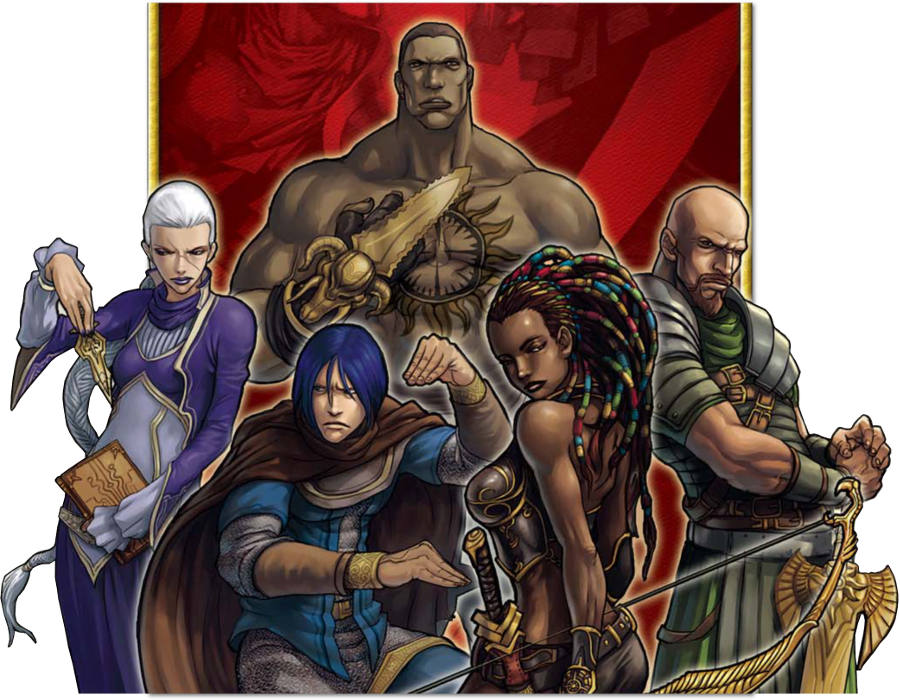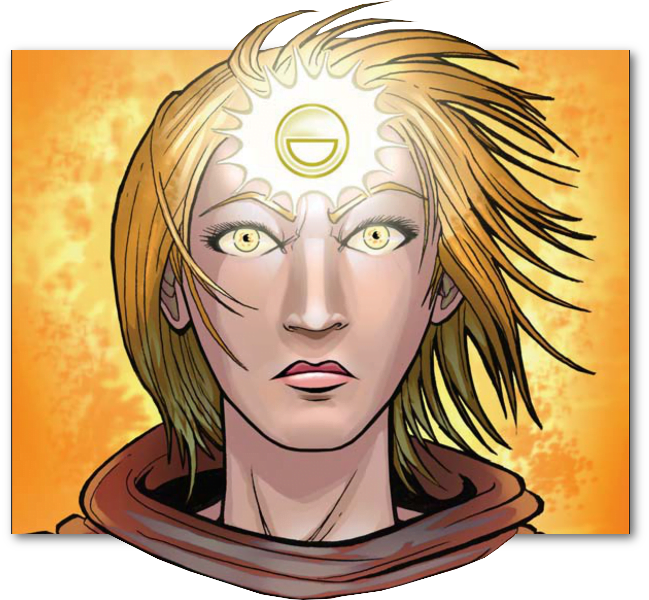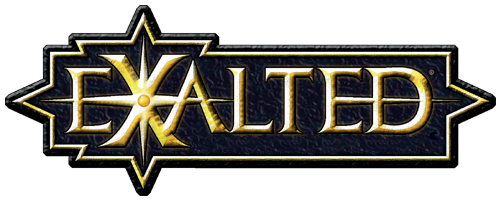Exalted is a tabletop roleplaying game of mythic fantasy that positioned itself as the counterpoint to Dungeons and Dragons 3rd edition, made first by White Wolf and later by Onyx Path. Onyx Path have faithfully carried on the legacy of White Wolf’s work, and by that, I mean, Exalted started out bad and has maintained being bad.
Bad is a hollow word for media criticism, I know, but it’s good to set a tone. I want you to bear that in mind, because there’s going to be a lot of things that make this game sound awesome. This game has a faction of communist revolutionary furries who are gay for the moon. See? Right there, that’s something that’s either awful (kinda) or amazing (also, kinda).
This presents part of the problem of discussing Exalted: A list of things in Exalted sounds like praise for it! In a way, that’s amazing! It’s got a sentient stealth bomber that lives in a volcano! See? Just like that, you react with what and want to know more!
Plus, there will be pretty pictures, because Exalted has always employed some excellent artists who sometimes do amazing work, and if Bioshock Infinite has taught us anything, it’s that really excellent aesthetics can make it very easy for people to take you seriously even if your game is actually really bad.
Hold to that truth. No matter what it sounds like I’m saying, I’m also saying that Exalted is bad.
Exalted is amazing.

There’s a tabletop RPG under all this glowing flavour. It’s a typical White Wolf game, which is to say, if you know White Wolf games, you’ll immediately be reaching to tell me how subtly different it was. Resist this impulse.
If you have no idea what I mean, the basic resolution mechanic is done by dice pools. You work out how good you are at a thing by taking a base value, adding some other values that change from circumstance to situation, and that number represents your dice pool. You take that many dice (in this case D10s), roll them, and check how many of them exceed a target number. This is a pretty neat system, and the first time you see it, especially if you’re mostly exposed to games like D&D, you may think it looks very exciting and interesting. Don’t worry, though, Exalted doesn’t do anything good with it.
No, what Exalted is, really, is a big what-if Alternate Universe that started as a deliberate attempt to transplant the entire White Wolf World of Darkness into a world of mythic high fantasy, wholesale uprooting ‘Werewolves’ and ‘Vampires’ and ‘Mages’ and dropping them into another world. A brand new world, where they could be fresh and new and break free from the shackles of Urban Fantasy and the stifling confines of a reality as we perceived it. It was the idea that we loved the World of Darkness so much, we would want to see it again, but in a more alien world. In genesis, Exalted is an absolutely staggering exercise of marketplace genital-waving, a deliberate excessive victory lap for the successes of what was, and has always been, a second placer in the tabletop RPG market.
This transubstantiation needed some unique elements; it’s not quite as simple as a one-for-one comparison. There’s simply an impressive amount of stuff in this setting, and because it doesn’t have a typical setting’s ideas of when or where or how you should play, or an actual linear history, or a conception of its own scale or scope, or any kind of good, approachable user experience, and that means to talk about Exalted the game is mostly to talk about its setting, and to do that, you need to cover a lot of ground.
To describe the Exalted setting and its lore all in one big go is a fool’s errand, but who am I to say I am not a fool tonight?

The world of Exalted is a fantasy world called Creation, wrought by gods and surrounded on all sides by the endless boundless weirdness of the Wyld, which you know is special because it’s spelled with a Y. In this world there are powerful beings, the Exalted, who are chosen by gods (or elemental dragons, or the laws of physics, or dead things that predate the gods), and who have a soul permanently marked with the flag ‘can Exalt.’ Near-godhood is tethered to your soul, but that doesn’t mean you’re going to spend your life doing cool things. That flag needs to get set ‘on’ by some experience in your life, and that experience is tied to the type of Exalt you are.
Solar Exalts are your ‘basic’ characters, but they’re also probably the most powerful. Solars exalt when they do something beyond their limits – literally when they ‘give 110% to something.’ Then there are are Lunars, based on the World of Darkness Werewolves, who are shape-shifting animal people connected to the moon. They Exalt when they’re chosen to, by the moon, and it’s all kinda creepy and coercive-marriagey if you ask me (and you kinda did). There are Sidereals, time-travelling kung fu monks modelled on the World of Darkness Mages. Because Sidereals know the future (collectively), they’re chosen at birth, whisked off to a monastery, then raised to be ready for their Exaltation. There are also Abyssals, who are like Vampires, death-bringing omnicides, who Exalt when they’re about to die a violent death and are offered a chance to live on by an undead megagod. Rounding out this core group there’s also the Dragonblooded, who are the most ‘human-like’ of Exalts, whose Exaltation can be refined and encouraged through breeding and other positive applications of eugenics in-setting. They don’t seem to map to anything from World of Darkness, but it’s a big world and I’m not going to spend too much of my life on this.
There are more types – bringing in more World of Darkness ideas including the Prometheans and the Alchemicals, but they’re very much secondary-important creatures for now.
There’s a clear power hierarchy, both in-universe and out. Solar Exalts tend to get the most powerful stuff, the most efficient superpowers, and the most likely to get powers that let them say ‘I win’ in any confrontation. Dragonblood are at the bottom of this pyramid, with powers that are much more about ‘trying harder’ than necessarily guaranteeing a success. This is carried out in the setting, too, which is –
Okay, this is a bit, but this is a post-apocalyptic post-apocalyptic post-apocalyptic setting teetering on the edge of more apocalypses. In the second of those post-apocalypses, the Solar exalted established an empire that followed the power hierarchy, where the people whose literal job was ‘be the best at everything’ ran the world.
Except, oh no! they ran the world so badly the Dragonborn overthrew them, bringing on that third apocalypse, and now the world is literally in an inverted state! This is after the Solars plotted to overthrow the previous order, so oh no, dramatic irony! After the revolution, there’s an empire of Dragonborn who run the world and they have an inquisition that hunts for the Solars and generally keeps the other Exalts in line with propoganda and extensive murder. Since the powers of Exalts are tied to their souls, and the people in question all reincarnate, it’s a bit like playing celestial whack-a-mole.
The Dragonblooded were able to topple the Solars, in part thanks to the presence of a special Exalt-only problem known as the Great Curse. In that first apocalypse, the Solars killed off the Megagods, the gods of the gods, and those people were so pissed about this as they died, they cursed all the Exalts. This curse takes on a number of forms, depending on the type of Exalt you are.
Solars are doomed to lose control over themselves at some point, to fulfill the mythic arc of a tragic hero. Built in to every Solar is a powerful virtue, which will eventually be their downfall. Lunars lose their ability to empathise with humans and maintain control of the shape of their body. Abyssals have to feed reality to death, and if they don’t and start living an ordinary life, the feedback starts breaking things and killing people like a Final Destination movie. Sidereals are cursed such that the more Sidereals are gathered in one spot, the more collectively stupid they are, and unable to notice. This means that when they come together to coordinate their vast, Creation-wide conspiracies, it’s sort of a DoofusCon, where a bunch of smart people devise the worst possible idea then split up to enact it, confident that the plan they’re following is a good one.
Dragonblooded, incidentally, just spark off with their elemental type a bit. Like, they’re not actually that cursed.
The curse is known to almost nobody, including two gods, and those gods could probably hypothetically do something about it, but it would involve getting the other gods on board to help, and those gods are busy, playing a game. Literally. It’s called the Games of Divinity, and the reason for that aforementioned Megagods mess back in history was because the Megagods were too busy playing this game. Once the Megagods were deposed the gods immediately started doing the exact thing they’d ousted those gods for doing, in the most epic-scale case of Mom Says It’s My Turn To Play Xbox. The gods are there, they’re powerful, but they don’t want to spare you any attention for a minute more than they have to.
You follow all that? That’s the pitch: A variety of different types of interestingly-empowered god-chosen people in a mythic non-European fantasy setting, who are trying to make good on a destiny guided by absentee gods while struggling with their own worst selves.
Now let’s talk about how they fuck it all up.

Even if Exalted was not a mass of needlessly edgy content warnings and orientalism in principle, and even if its storytelling and world lore was not so thoroughly soaked in the occasional moments of ‘oh, so that’s what this writer masturbates to,’ it’s nonetheless let down by having a mechanical system that has heard of game balance, has very high opinions on it, and yet also doesn’t understand it. I mean it – as kindly as I possibly can, every time I’ve seen an Exalted writer talk about the mechanics of the game system, the absolute best impression I’ve had is “I don’t know and I don’t care.”
One can make a case that it doesn’t matter if the rules are broken in Exalted because players are already throwing around huge piles of dice and can succeed at most mundane things, so the only challenges are in thinking their ways around the problems that can’t be resolved with chucking some dice, but then the question falls to why the game is built around that in the first place.
Talking about the failings of Exalted as a game design is difficult because specific examples seem to be too overwhelming, too common, but even generalities need to be viewed in terms of their intricacies. It’s not just that the mechanics are bad, the method it uses to tell you about those mechanics is bad. It’s not just that the method is bad, it’s implemented badly. It’s not just that the implementation of the method is bad, it’s that the implementation is badly edited.
Talking about bad charms means explaining to you charms, which brings with it charm trees and the way some of those charms are essential to play, and the way sometimes these charms are worded in ways that literally don’t function or are worse than not having the charm. You may not even know what charms are at this point, and I’m already stuck trying to decide what direction to tackle this problem like I’ve been handed a cake half a mile wide.

The complicated mistakes that lay at the heart of the game require you to have some familiarity with it. You don’t have the time to get a minor doctorate in a bad game’s bad designs, which means to try and instruct the uninformed of the game’s failures means having to point to things that would be conventionally seen as obvious mistakes.
Instead, let’s look at a really small, simple example of the kind of things that show the game’s problems.
In the core rulebook, the table of contents doesn’t appear until page 11.
Character creation doesn’t show up until page 68.
The entire core rules section on ‘storytelling,’ for running the game, is 16 pages long.
This section includes a small sidebar about ‘fleshing out characters,’ and ‘what to do in a campaign,’ but it does have half a page dedicated to complex travel. It contains a description of four game styles, with one literally labelled ‘miscellaneous.’ Now, not to compare a terrible game to a great one, but Blades in the Dark fills its back-end with all sorts of tools that generate scenarios – but Exalted instead dedicates its space to telling you about lore while never connecting to why a player might care about being part of that lore.
Exalted rulebooks are fractals of jagged, awkward failure, where the best way to read them is with overwhelming confidence that you’re sure you understand the rules. If you think the rules work a particular way, rely on that. If they feel right, that’s probably exactly how the game should go. Don’t double check Charms against one another, don’t try to make choices based on what you think will be most effective for achieving your wants – go by gut feel and the coolness of the charm names, and trust your storyteller’s judgment about what you can or can’t handle. Of course, there’s no way the Storyteller can really be sure of what you can handle based on the tools in the game, making the task of designing sessions enormous work which can often include building whole characters just to be sure of the charms and essence available. Lots of fun math there.
It’s a very common basic problem of the era of tabletop games, of course, but Exalted doesn’t seem to think it’s all that important. There’s a talk about the idea of a session zero (‘prelude’), but with those sixteen pages of storytelling advice they provide precious little about how to actually structure a game or a sesion, or even basic ideas of how to properly challenge your players. After all, this isn’t that game with its levels in it, this is a much better game that requires you to track two experience values with fractions like 5/29.
God, the Jargon, too. It’s jargony on a level most games would intuitively avoid – at a certain point you’d run out of ways to describe some things with a different word for a different Exalt type. Can you intuitively tell the difference between a circle, a band, a sworn brotherhood or coven? Because they’re all literally the same damn thing, and most games just call them a ‘group’ or ‘party.’
There are also structural failures in design, too. When you present players like me with the idea that there are Solar Exalts connected to the sun, Lunar exalts connected to the moon, Sidereals connected to time, and so on, my natural inclination is to think of a group of adventurers made up of some Solars, some Lunars, some Sidereals. That’s not how these games are designed or balanced (hah). No, the Solars play with Solars, the Sidereals play with Sidereals, the Lunars play with Lunars and so on. Hypothetically, this is because these Exalted types aren’t balanced for mixed groups, and they’re all meant to exist on different, interesting levels of power to give you meaningfully different campaigns, but since there’s almost no definition to your opposition or mathematical balance to enemies, it just seems like a better structural design to treat each Exalt type as someone who can join a group of Exalts, and balance them all for one level.
There’s a tip: Don’t try and balance a game across five levels if you can’t reasonably balance it well on one.
There’s some half-hearted maybe-sorta-guess-you-could-try-it mangling of rules to make a mixed party work, but it isn’t actually given any rules or guidelines. You’re told you can do it, but you’ll have to give the lesser Exalts more XP. How much more? How often? It doesn’t say. Why should it say? Just eyeball it, it’ll be fine.
You can run Exalted. The game functions. It’s just that it’s bad at functioning. As a game, it strives to be the kind of game that keeps out of your way while you tell stories, while also simultaneously being a big, crunchy game of epic fantasy and character building with sophisticated trees of choices . It’s impressive how thoroughly bad it is at doing either. This is a game that wants you to feel free to create daring stunts and banter on the fly in your combat moves, but has stats for working out how long you can talk based on your breath capacity.
There’s a sickness at the root of this game, a failure to understand what the purpose of a RPG system is even for, focused instead on trying to demonstrate what it’s not. For a game made to celebrate the sheer excellence of their own branding and mechanics, Exalted is clearly a game aware that it is a second choice. Exalted wishes it could position itself as the counterpoint to D&D – it even tried to. Around the launch of 2nd Edition Exalted and 3.5 D&D, White Wolf tried to distribute certificates for people who could prove they’d traded away their D&D books for Exalted books, as a sort of literal graduation to ‘real’ games.
They wanted to compete with 3.5 D&D while treating the reasons people play that as ridiculous. It extolled itself on its appreciation of diversity, expression and story, while absolutely embracing mechanical design that failed to allow players those things. It was adult in that you could see nipples in the core rulebook, diverse in that some of the harem slaves were also white, and story driven in that the mechanics were simply not capable of crafting narrative with you while still dedicating four pages to describing an imperial currency system in a way some lesser game would describe with a table. This is a game that wants to enable smooth, stylish combat where your words and imagination have more weight, and only asks you to do a little bit of order-of-operations math to make sure that you can properly pay for it.

I feel so bad talking about this game like this, because the game it wants to be is a game I want to play. It wants to bring together mythic high fantasy and a cultural frame of reference that isn’t just more European fantasy. It has the Exalted, chosen people whose souls are entangled with something that started before they were born, with the life they lead now defined by how they use the superheroic fantasy powers thrust upon them. It is kung fu superhero god-killing excess where everyone can be cool and hot and plays to the hardest edge of Early 2000s Amerimanga aesthetic.
Now, knowing this, you know that Exalted exists, it has interesting ideas, and it has a really, really bad execution, right? Was this what I wanted to talk about, you may wonder?
No.
I want to talk about my favourite Exalt type. This is just the introduction to that article, which will come out later this month.
